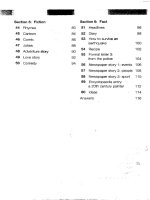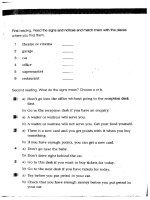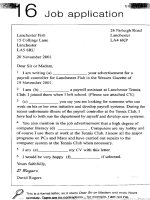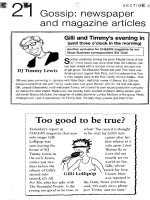Test your english finance market chapter 22
Bạn đang xem bản rút gọn của tài liệu. Xem và tải ngay bản đầy đủ của tài liệu tại đây (90.97 KB, 5 trang )
FI 301- Ch. 10
Học trực tuyến tại quizlet.com/_9k3yi
1.
2.
3.
4.
c) the stocks
are issued by
corporations
to raise shortterm funds
d) may not
receive a
dividend
every year
c) cumulative
provision
b) less; can
Which of the following statements is
incorrect?
A) A stock is a certificate representing partial
ownership in a corporation.
B) Like debt securities, common stock is
issued by firms to obtain funds.
C) Stocks are issued by corporations to raise
short-term funds.
D) The secondary stock market enables
investors to sell stocks that they had
previously purchased.
Preferred shareholders:
A) typically have the same voting rights as
common shareholders.
B) do not share the ownership of the firm
with common shareholders.
C) typically participate in the profits of the
firm beyond the stated fixed annual
dividend.
D) may not receive a dividend every year.
A _______ requires that dividends cannot be
paid on common stock until all current and
previously omitted dividends are paid on
preferred stock.
A) residual claim
B) preferred margin
C) cumulative provision
D) liquidation claim
Firms assume _______ risk when they issue
preferred stock than when they issue bonds.
The payment of dividends on preferred
stock _______ be omitted without the firm being
forced into bankruptcy.
A) more; can
B) less; can
C) more; cannot
D) less; cannot
5.
b) initial public
When a corporation first decides to issue
stock to the public, it engages in a(n) _______
offering.
A) secondary
B) initial public
C) seasoned equity
D) none of these
6.
b) shelfregistration
A firm can best avoid the time lag between
registering new securities with the SEC and
actually selling them by:
A) use of proxy.
B) shelf registration.
C) use of a margin call.
D) use of preemptive rights.
7.
c) offer;
secondary
market
building
The process by which the lead underwriter
solicits indications of interest by institutional
investors in an IPO at various possible _______
prices is referred to as _______.
A) IPO; margin selling
B) offer; secondary market building
C) offer; bookbuilding
D) IPO; bookbuilding
8.
c) 7
The transaction costs to the issuing firm in an
IPO is usually _______ percent of the funds
raised.
A) 5
B) 6
C) 7
D) 25
9.
b) downward
If investors quickly sell an IPO stock in the
secondary market, there will be _______
pressure on the stock's price.
A) upward
B) downward
C) no additional
D) none of these
10.
b) prevent
downward
pressure on
the stock's
price
The purpose of a lockup provision is to:
A) keep individual investors from buying and
selling stock.
B) prevent downward pressure on the stock's
price.
C) increase the number of outstanding
shares.
D) allocate a larger proportion of stock to
institutional investors.
11.
c) decreases
significantly
When the lockup period expires, the share
price commonly:
A) remains unchanged.
B) increases significantly.
C) decreases significantly.
D) does none of these.
12.
b) 20
The initial (one-day) return of IPOs in the
United States has averaged about _______
percent over the last 30 years.
A) 10
B) 20
C) 30
D) 50
13.
a) flipping
The practice of purchasing IPO stock at the
offer price and selling the stock shortly
afterward is called:
A) flipping.
B) skiing.
C) flopping.
D) none of these.
14.
b) spinning
_______ occurs when an investment bank
allocates shares from an IPO to
corporate executives who may be
considering an IPO or other business
that will require the help of an
investment bank.
A) Flipping
B) Spinning
C) Laddering
D) None of these
15.
c) laddering
When brokers encourage investors to
place bids for IPO shares on the first
day that are above the offer price this
is referred to as:
A) flipping.
B) spinning.
C) laddering.
D) none of these.
16.
b) poorly
On average, IPOs of firms tend to
perform _______ over a period of a year
or longer.
A) well
B) poorly
C) better than the S&P 500 index
D) none of these
17.
c) at the prevailing
market price
A firm will typically attempt to sell
shares from a secondary offering:
A) below the prevailing market price.
B) above the prevailing market price.
C) at the prevailing market price.
D) at the offer price of the IPO.
18.
d) a
telecommunications
network
Buy and sell orders on the OTC market
are completed by:
A) auction on the trading floor.
B) sealed competitive bids.
C) noncompetitive bids.
D) a telecommunications network.
19.
a) ARD
A(n) _______ is a certificate which
represents owner¬ship of a foreign
stock.
A) ADR
B) SEAQ
C) NASDAQ
D) AMEX
20.
d) initial public
offering (IPO)
The first-time issuance of shares by a
specific firm to the public is referred to
as a(n):
A) stock repurchase.
B) secondary stock offering.
C) initial rights issue.
D) initial public offering (IPO).
21.
b) secondary
stock
offering
A new stock issuance by a specific firm that
already has stock outstanding is referred to
as a(n):
A) stock repurchase.
B) secondary stock offering.
C) initial rights issue.
D) initial public offering (IPO).
22.
c)
undervalued;
overvalued
Managers of firms may consider a stock
repurchase or even a leveraged buyout when
they believe their stock is _______ by the market,
or a secondary stock offering when they
believe their stock is _______ by the market.
A) undervalued; undervalued
B) overvalued; overvalued
C) undervalued; overvalued
D) overvalued; undervalued
E) none of these
23.
a) New York
The largest organized exchange, listing the
largest firms, is the _______ Stock Exchange.
A) New York
B) American
C) Midwest
D) Pacific Stock
24.
c)
independent
brokers
_______ are employed by brokerage houses and
execute orders for clients on the floor of the
NYSE.
A) Specialists
B) Commission brokers
C) Independent brokers
D) Dealers
25.
d) none of
these
Firms listed as "pink sheets" on the OTC
market:
A) are typically very large.
B) satisfy NASDAQ's listing requirements.
C) are typically owned by various institutional
and individual investors.
D) none of these.
26.
b) priceearnings
ratio
The prevailing price per share divided by the
firm's earnings per share is known as the:
A) dividend yield.
B) price-earnings ratio.
C) fully diluted earnings per share.
D) annual dividend.
27.
a) Dow Jones
Industrial
Average
The _______ is a price-weighted average of
stock prices of 30 large U.S. firms.
A) Dow Jones Industrial Average
B) Standard and Poor's 500
C) New York Stock Exchange Index
D) NASDAQ
28.
b) Standard
and Poor's
500
The _______ is a value-weighted index of stock
prices of 500 large U.S. firms.
A) Dow Jones Industrial Average
B) Standard and Poor's 500
C) New York Stock Exchange Index
D) NASDAQ
29.
d)
undervalued
Sudden favorable news about the
performance of a firm will make investors
believe that the firm's stock is _______ at its
prevailing price.
A) overvalued
B) fixed
C) appropriate
D) undervalued
30.
b) monitor
changes in
firm value
over time
The easiest way for shareholders to monitor
the firm is to:
A) call management on a weekly basis.
B) monitor changes in firm value over time.
C) attend the annual shareholders' meeting.
D) read the annual report.
31.
a) share price
Shareholders can most easily measure a
firm's performance by monitoring changes in
its _______ over time.
A) share price
B) employee job descriptions
C) board of directors
D) asset size
32.
c) it allows public
accounting firms to offer
non audit consulting
services to an audit client
whether the client's
committee pre-approves
the non audit or not not
Which of the following is not
true regarding the SarbanesOxley Act?
A) It attempts to force
accountants to conform to
regular accounting standards
in preparing a firm's financial
statements.
B) It requires that only outside
board members of a firm be
on the firm's audit committee.
C) It allows public accounting
firms to offer nonaudit
consulting services to an audit
client whether the client's
audit committee pre-approves
the nonaudit services or not.
D) It prevents members of a
firm's audit committee from
receiving consulting of
advising fees or other
compensation from the firm
beyond that earned from
serving on the board.
33.
d) all of these are examples
of shareholder activism
An example of shareholder
activism is:
A) communication with the
firm.
B) engaging in a proxy
contest.
C) filing a lawsuit against the
board.
D) All of these are examples
of shareholder activism.
34.
c) leveraged buyouts
_______ are acquisitions that
require substantial amounts of
borrowed funds.
A) Stock repurchases
B) Corporate controls
C) Leveraged buyouts
D) Stock splits
35.
a) leveraged buyouts
_______ are not barriers to
corporate control to eliminate
agency problems.
A) Leveraged buyouts
B) Antitakeover amendments
C) Poison pills
D) Golden parachutes
36.
d) does all
of these
Listing stock on a foreign stock exchange:
A) enhances the stock's liquidity.
B) may increase the firm's perceived financial
standing.
C) may protect a firm against hostile
takeovers.
D) does all of these.
43.
a)
well;
poorly
Initial public offerings (IPOs) perform _______ on the
day following the IPO and _______ for periods of a
year or longer after the IPO.
A) well; poorly
B) poorly; well
C) well; well
D) poorly; poorly
37.
c) stocks
American Depository Receipts (ADRs) are
similar to:
A) stock options.
B) bank deposits.
C) stocks.
D) bonds.
44.
d)
yellow
sheets
38.
a)
international
mutual
funds
_______ are portfolios of international stocks
created and managed by various financial
institutions.
A) International mutual funds
B) American Depository Receipts (ADRs)
C) World Equity Benchmark Shares
D) Initial public offerings (IPOs)
Which of the following is not a part of the over-thecounter market?
A) the NASDAQ National Market
B) the NASDAQ Small Cap Market
C) the OTC Bulletin Board
D) yellow sheets
E) All of these are part of the over-the-counter
market.
45.
c) 7.44
a)
international
mutual
funds
_______ sell shares to investors and use the
proceeds to invest in portfolios of
international stocks created and managed by
portfolio managers.
A) International mutual funds
B) American Depository Receipts (ADRs)
C) World Equity Depository Receipts
D) Initial Public Depository Receipts
A firm has a current stock price of $15.32. The firm's
annual dividend is $1.14 per share. The firm's
dividend yield is _______ percent.
A) .74
B) 1.34
C) 7.44
D) 1.14
46.
a) true
From a cost perspective, preferred stock is a less
desirable source of capital for a firm than bonds.
A) true
B) false
47.
a) true
To the extent that shares sold during an IPO are
discounted from their appropriate price, the
proceeds that the issuing firm receives from the IPO
are lower than it deserves.
A) true
B) false
48.
b)
false
IPOs tend to occur more primarily during
recessions.
A) true
B) false
49.
b)
false
A firm that wants to engage in a secondary stock
offering does not need to file the offering with the
SEC.
A) true
B) false
50.
a) true
Unlike the organized exchanges, the OTC market
does not have a trading floor.
A) true
B) false
51.
b)
false
Initial public offerings (IPOs) tend to occur more
frequently during bearish stock markets.
A) true
B) false
52.
a) true
If the secondary market is inactive, then the shares
would be illiquid.
A) true
B) false
39.
40.
41.
42.
d) none of
these
c) demand;
supply; up
b) poison
pills
When a firm buys some of its shares that it had
previously issued, this is referred to as a:
A) reverse IPO.
B) leveraged buyout.
C) ladder spin.
D) none of these.
Whenever _______ exceeds _______, the stock price
will be driven _______.
A) supply; demand; up
B) demand; supply; down
C) demand; supply; up
D) none of these
Which of the following is not a form of
shareholder activism?
A) investors communicating their concerns to
other investors in an effort to place more
pressure on the firm's managers or its board
members
B) poison pills
C) shareholder lawsuits
D) All of these are forms of shareholder
activism.
53.
a)
true
Private firms that need a large equity investment but
are not yet in a position to go public may attempt to
obtain funding from a venture capital (VC) fund.
A) true
B) false
64.
b)
false
As a result of the Sarbanes-Oxley Act, firms were able
to reduce their costs of compiling and reporting
financial information.
A) true
B) false
54.
b)
false
Venture capital (VC) funds receive money from wealth
investors and from pension funds that need to receive
their money back in one year or less.
A) true
B) false
65.
a)
true
As a result of the Sarbanes-Oxley Act, there was a
reduced likelihood of fraudulent financial reporting by
firms.
A) true
B) false
55.
a)
true
Venture capital (VC) funds commonly serve as
advisors to the businesses in which they invest.
A) true
B) false
66.
a)
true
The legal protection of shareholders varies
substantially among countries.
A) true
B) false
56.
b)
false
Venture capital (VC) funds usually invest in publicly
traded businesses.
A) true
B) false
67.
a)
true
57.
b)
false
Venture capital (VC) funds typically plan to exit from
their original investment within a period of about one
year.
A) true
B) false
Common law countries such as the U.S., Canada, and
the United Kingdom allow for more legal protection
than civil law countries such as France or Italy.
A) true
B) false
68.
a)
true
The government enforcement of securities laws varies
among countries.
A) true
B) false
b)
false
The phrase "leaving money on the table" refers to
investors who pay more for a stock in the secondary
market than was paid by those investors who were
able to buy shares at the initial (offer) price on the IPO
date.
A) true
B) false
69.
b)
false
The laws of the financial information that must be
provided by public companies is similar among all
developed countries.
A) true
B) false
70.
b)
false
Electronic communications networks (ECNs) are
passive funds that track a specific index.
A) true
B) false
71.
a)
true
The net asset value of an international ETF is
determined by translating the foreign currency value
of the foreign securities into dollars.
A) true
B) false
58.
59.
a)
true
Underwriters sell most of the shares of an IPO to
institutional investors.
A) true
B) false
60.
b)
false
The total cost of engaging in an IPO is usually about 1
percent of the total proceeds.
A) true
B) false
61.
a)
true
Since the Sarbanes-Oxley Act of 2002, the initial
returns resulting from an IPO have generally been
smaller.
A) true
B) false
62.
b)
false
In general, secondary offerings cause an immediate
increase in the market price of the stock.
A) true
B) false
63.
a)
true
Electronic stock exchanges that execute stock
transactions electronically are referred to as
electronic communications networks (ECNs).
A) true
B) false









